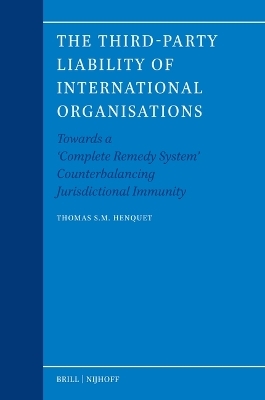
The Third-Party Liability of International Organisations
Martinus Nijhoff (Verlag)
978-90-04-53207-6 (ISBN)
In the broader context of the accountability of international organisations, this book focuses on the obligation of the United Nations - like many other organisations - to ‘make provisions for appropriate modes of settlement of [...] disputes of a private law character’ to which it is a party. The book advocates a systematic approach in conformity with the rule of law in discharging that obligation. That is needed to increase the legitimacy of international organisations, while bolstering their jurisdictional immunity. The work also develops the basic features of a comprehensive dispute settlement mechanism, complemented by a new United Nations convention.
Thomas S.M. Henquet, Ph.D. (Leiden University), LL.M. (Yale University), LL.M. (University of Amsterdam), specialises in international law and dispute resolution. He has acquired broad experience in these areas, working in international organisations, government and private practice. He has also lectured and published on a number of related topics.
Preface
Acknowledgments
Abbreviations
1 Introduction
1.1 Introduction
1.2 Research Objective and Research Questions
1.2.1 Case Studies: Introduction
1.2.2 The Rule of Law
1.3 Structure and Outline of the Study
2 The International Organisations Law Framework Governing Third-Party Remedies
2.1 Introduction
2.2 The Legal Status of International Organizations in Domestic Legal Orders and the International Legal Order
2.2.1 Domestic Legal Personality, and Privileges and Immunities
2.2.2 International Legal Personality
2.2.2.1 Legal Consequences of International Legal Personality: The ario
2.2.3 Interim Conclusions
2.3 How Are International Organisations, and the UN in Particular, Bound by International Law?
2.3.1 Treaty Law, General International Law and jus cogens
2.3.1.1 Treaty Law
2.3.1.2 General International Law
2.3.1.3 Jus cogens
2.3.2 Sources of Obligations Specific to the UN
2.3.2.1 ‘Constitutional’ Obligations
2.3.2.2 Kosovo under unmik Administration
2.3.3 Interim Conclusions
2.4 International Human Rights Law
2.4.1 Primary Rules
2.4.2 Secondary Rules: the ‘Right to a Remedy’
2.4.2.1 Procedural Obligations
2.4.2.2 Substantive obligations
2.4.3 Interim Conclusions
2.5 Conclusions
3 Section 29(A) of the General Convention
3.1 Introduction
3.2 The UN Is Bound by the Obligation under Section 29 of the General Convention
3.2.1 The General Convention Is Binding on the UN
3.2.2 Failure to Implement Section 29 of the General Convention and Jurisdictional Immunity
3.2.2.1 Whether the UN’s Entitlement to Immunity Is Conditional on Its Compliance with Section 29 of the General Convention
3.2.2.2 Denying the UN’s Immunity in Response to ‘Material Breach’ or as a ‘Countermeasure’
3.3 Overview of Practice of the UN under Section 29(a) of the General Convention
3.3.1 Key Documents Setting Out the Practice and Regulations of the UN
3.3.2 The UN’s Practice Per Category of Dispute
3.3.2.1 Disputes ‘Arising Out of Commercial Agreements (Contracts and Lease Agreements)’
3.3.2.2 Other Disputes of a Private Law Character
3.3.2.3 ‘Other Claims’
3.3.3 From Srebrenica to Haiti: Introduction to Case Studies
3.3.3.1 The Srebrenica Genocide
3.3.3.2 The Kosovo Lead Poisoning
3.3.3.3 The Haiti Cholera Epidemic
3.4 Discussion: ‘A Complete Remedy System to Private Parties’?
3.4.1 General Observations Regarding Section 29 of the General Convention
3.4.1.1 ‘Disputes … to Which the UN Is a Party’
3.4.1.2 Liability and Responsibility
3.4.1.3 Who Decides?
3.4.1.4 Interim Conclusions
3.4.2 ‘Private Law Character’
3.4.2.1 ‘Private Law Character’: Interpretation
3.4.2.2 UN Practice Regarding ‘Private Law Character’
3.4.2.3 Interim Conclusions
3.4.3 ‘Provisions for Appropriate Modes of Settlement’
3.4.3.1 ‘Appropriate Modes of Settlement’
3.4.3.2 Applicable Law: The UN Liability Rules
3.4.3.3 Interim Conclusions
3.5 Conclusions
4 The Jurisdictional Immunity of International Organisations in the Netherlands and the View from Strasbourg
4.1 Introduction
4.2 Immunity from Jurisdiction
4.2.1 Rationale
4.2.2 Sources
4.2.3 Procedural Aspects
4.2.4 ‘Functional Immunity’
4.3 Immunity from Jurisdiction and ‘Access to Court’
4.3.1 Waite and Kennedy
4.3.2 ‘Reasonable Alternative Means’: Beyond Waite and Kennedy
4.3.2.1 Interim Conclusions
4.3.3 Absence of Reasonable Alternative Means: Mothers of Srebrenica
4.3.3.1 Immunity from Jurisdiction, Access to Court and Reasonable Alternative Means
4.3.3.2 ‘Civil Right’ under Article 6(1) of the echr in Light of Section 29 of the General Convention
4.3.3.3 Resolving the Conflict between Jurisdictional Immunity and Access to Court Absent Reasonable Alternative Means
4.4 Reducing ‘Accountability Gaps’: A Role for National Courts?
4.5 Conclusions
5 Towards a ‘Complete Remedy System’ for Third-Parties under Section 29 of the General Convention
5.1 Introduction
5.2 Proposed Solutions
5.2.1 The Legal Character of Third-Party Disputes
5.2.2 (Standing) Claims Commissions
5.2.2.1 A Revised Legal Framework for Standing Claims Commissions
5.2.2.2 The Consistent Interpretation and Application of the UN Liability Rules
5.2.3 Arbitration
5.2.3.1 Appropriate Arbitration Rules for Third-Party Disputes
5.2.3.2 Neutral Arbitration of Third-Party Disputes: Denationalised and Self-Contained Arbitration
5.3 The Mechanism for the Settlement of Disputes of a Private Law Character
5.3.1 Amicable and Contentious Dispute Resolution under the Auspices of the pca
5.3.1.1 Amicable Dispute Resolution
5.3.1.2 Contentious Proceedings: First Instance Tribunals and the Standing Appellate Tribunal
5.3.1.3 The Permanent Court of Arbitration
5.3.2 Establishment and Legal Framework of the Mechanism
5.3.2.1 The unga Resolution
5.3.2.2 The Convention
5.3.2.3 Financial Implications
5.3.3 Other International Organisations
5.4 Conclusions
6 Findings and Conclusions
6.1 Findings
6.2 Concluding Observations
Bibliography
Table of Cases
Index
| Erscheinungsdatum | 25.07.2023 |
|---|---|
| Reihe/Serie | Legal Aspects of International Organizations ; 63 |
| Sprache | englisch |
| Maße | 155 x 235 mm |
| Gewicht | 1029 g |
| Themenwelt | Recht / Steuern ► EU / Internationales Recht |
| Recht / Steuern ► Öffentliches Recht ► Völkerrecht | |
| ISBN-10 | 90-04-53207-2 / 9004532072 |
| ISBN-13 | 978-90-04-53207-6 / 9789004532076 |
| Zustand | Neuware |
| Haben Sie eine Frage zum Produkt? |
aus dem Bereich


